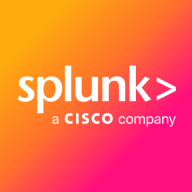

Splunk Enterprise Security and VMware Aria Operations for Logs both compete in the field of centralized log analytics and data correlation. Based on feature integration, Splunk appears to have an edge due to its extensive app ecosystem and advanced analytics capabilities.
Features: Splunk Enterprise Security provides strong integration with various tools, offering centralized log analytics, data correlation, and machine learning capabilities for efficient data analysis and reporting. Its vast app ecosystem supports advanced analytics, enhancing its functionality significantly. VMware Aria Operations for Logs is noted for its VMware integration and centralized management capabilities that offer an infrastructure overview through real-time errors and log centralization.
Room for Improvement: Both products face high pricing concerns. Splunk's pricing model is complex, and users desire simpler setup and larger data handling capabilities. It could also improve third-party integration. VMware needs better user interface enhancements and more flexible log retention options. Dashboard flexibility and third-party tool integration could enhance VMware's appeal beyond VMware environments.
Ease of Deployment and Customer Service: Splunk Enterprise Security offers flexible deployment options across public, private, hybrid clouds, and on-premises environments, though it may present a learning curve for new users. Its customer service is generally rated well, though experiences vary based on support tier. VMware Aria Operations for Logs operates primarily in on-premises and hybrid cloud environments with simpler implementation aligned with VMware products. Its technical support is rated positively for quicker responses.
Pricing and ROI: Splunk is expensive, particularly for smaller enterprises, with a pricing model based on data ingested, leading to high costs. Despite this, users find the investment worthwhile due to its extensive features and flexibility. VMware Aria Operations for Logs is seen as more cost-effective, with licensing based on hardware, not data volume, making it attractive for budget-conscious organizations. Both tools offer potential high ROI through operational efficiencies and comprehensive IT environment visibility.
The documentation for Splunk Enterprise Security is outstanding. It is well-organized and easy to access.
We couldn't calculate what would have been the cost if they had actually gotten compromised; however, they were in the process, so every investment was returned immediately.
On average, my SecOps team takes probably at least a quarter of the time, if not more, to remediate security incidents with Splunk Enterprise Security compared to our previous solution.
We have paid for Splunk support, and we’re not on the free tier hoping for assistance; we are a significant customer and invest a lot in this service.
I have had nothing but good experiences with Splunk support, receiving timely and helpful replies.
We've had great customer success managers who have helped us navigate scaling from 600 gigs to 30 terabytes.
While support staff is knowledgeable, getting access to specialists can be challenging when dealing with the limits of a product.
Customer service and support have declined.
I did not need technical support because I am a professional with VMware.
We currently rely on disaster recovery and backup recovery, which takes time to recover, during which you're basically blind, so I'm pushing my leadership team to switch over to a clustering environment for constant availability.
It is one of the things that separates it from other tooling, and if not, it is the most scalable solution out there.
They struggle a bit with pure virtual environments, but in terms of how much they can handle, it is pretty good.
Since payment is based on hardware, scalability impacts are managed more effectively than with other tools paid by data volume.
It's relatively easy to find individuals with the skills to work with VMware because it is a widely spread tool.
They test it very thoroughly before release, and our customers have Splunk running for months without issues.
Splunk has been very reliable and very consistent.
We need more SMEs, and there is no mechanism to tell us about indexer or search head issues.
Managing a lot of data involves reliance on hardware and network performance, which are external factors that can affect stability.
It has been very stable, and every time I needed it, it was available and working.
VMware as a whole provides very stable tools.
Improving the infrastructure behind Splunk Enterprise Security is vital—enhanced cores, CPUs, and memory should be prioritized to support better processing power.
Splunk Enterprise Security is not something that automatically picks things; you have to set up use cases, update data models, and link the right use cases to the right data models for those detections to happen.
For any future enhancements or features, such as MLTK and SOAR platform integration, we need more visibility, training, and certification for the skilled professionals who are working.
It would be beneficial to have a roadmap for these dashboards to ensure consistent functionality.
There is also dissatisfaction with Broadcom's broader attitude, which is prompting me to search for alternatives.
VMware Aria Operations for Logs is not a cost-effective tool.
I saw clients spend two million dollars a year just feeding data into the Splunk solution.
The platform requires significant financial investment and resources, making it expensive despite its comprehensive features.
I find it to be affordable, which is why every industry uses it.
Splunk, often paid by the terabytes, becomes expensive quickly if not managed carefully.
The price has risen significantly, and for smaller customers, the cost can be up to ten times more than before.
VMware comes with a lot of packages, however, it remains too expensive.
This capability is useful for performance monitoring and issue identification.
I assess Splunk Enterprise Security's insider threat detection capabilities for helping to find unknown threats and anomalous user behavior as great.
Splunk Enterprise Security provides the foundation for unified threat detection, investigation, and response, enabling fast identification of critical issues.
This tool also provides greater insight when integrated with VMware infrastructure, making it more precise than other tools.
The most valuable features are log centralization and long-term retention for logs.
A valuable feature of VMware Aria Operations for Logs is its ability to allow personalization of dashboards and requests.
| Product | Market Share (%) |
|---|---|
| Splunk Enterprise Security | 6.8% |
| VMware Aria Operations for Logs | 1.5% |
| Other | 91.7% |
| Company Size | Count |
|---|---|
| Small Business | 112 |
| Midsize Enterprise | 50 |
| Large Enterprise | 266 |
| Company Size | Count |
|---|---|
| Small Business | 7 |
| Midsize Enterprise | 9 |
| Large Enterprise | 12 |
Splunk Enterprise Security delivers powerful log management, rapid searches, and intuitive dashboards, enhancing real-time analytics and security measures. Its advanced machine learning and wide system compatibility streamline threat detection and incident response across diverse IT environments.
Splunk Enterprise Security stands out in security operations with robust features like comprehensive threat intelligence and seamless data integration. Its real-time analytics and customizable queries enable proactive threat analysis and efficient incident response. Integration with multiple third-party feeds allows detailed threat correlation and streamlined data visualization. Users find the intuitive UI and broad compatibility support efficient threat detection while reducing false positives. Despite its strengths, areas such as visualization capabilities and integration processes with cloud environments need enhancement. Users face a high learning curve, and improvements in automation, AI, documentation, and training are desired to maximize its potential.
What Are the Key Features of Splunk Enterprise Security?In specific industries like finance and healthcare, Splunk Enterprise Security is instrumental for log aggregation, SIEM functionalities, and compliance monitoring. Companies leverage its capabilities for proactive threat analysis and response, ensuring comprehensive security monitoring and integration with various tools for heightened operational intelligence.
Manage data at scale with centralized log management, deep operational visibility and intelligent analytics for troubleshooting and auditing across private, hybrid and multi-cloud environments.
We monitor all Log Management reviews to prevent fraudulent reviews and keep review quality high. We do not post reviews by company employees or direct competitors. We validate each review for authenticity via cross-reference with LinkedIn, and personal follow-up with the reviewer when necessary.